Eczema, also known as dermatitis, is a common skin condition affecting people of all ages and both genders. The affected skin is in almost each and every type of eczema red, dry, hot, and itchy. Eczema is not contagious i.e., it cannot spread from one person to another. In spite of that, this is a serious medical condition that may sometimes be unbearable and difficult to treat.
As far as pregnant women are concerned, they are most commonly affected by atopic eczema, a hereditary form of eczema associated with exposure to environmental allergens. The chance of developing atopic eczema is higher in pregnant women who are already suffering from asthma, hay fever, and some food allergies. Apart from atopic eczema, pregnant women may also develop contact eczema.

Eczema during Pregnancy Approaches and Treatment Options
In case a pregnant woman develops eczema, the condition must be confirmed, and the doctor must also determine the disease's exact type. The very pregnancy may aggravate eczema once typical skin changes occur. When the exact type of eczema is determined, the doctor opts for the most suitable treatment.
Pregnant women are allowed some medications while they should abstain from certain drugs that can be detrimental to the baby or the pregnancy itself.
Some topical steroids may be allowed during pregnancy. Still, these are supposed to be used in small quantities and for a short period of time. Pregnant women should avoid corticosteroids in all forms. Doctors, however, believe that small doses of steroids, once the drug is applied topically, cannot be absorbed enough to cause systemic effects.
Furthermore, a woman should consult her doctor prior to taking antihistamines, medications that alleviate itchy sensations, and other symptoms of eczema.
Cyclosporine, certain topical or oral antibiotics, Protopic and Elidel, and many more are efficient against eczema, but they are strictly forbidden for pregnant women. The same refers to all herbal and Chinese medicine which, if taken prior to consulting a doctor, may cause serious damage to the baby and the pregnant woman herself.
- Eczema is the most common dermatosis of pregnancy, accounting for between a third and a half of all cases. Only 20-40% of patients are estimated to have a pre-existing history of eczema; the rest develop symptoms for the first time during pregnancy. Three quarters of these patients develop symptoms within the first two trimesters. The total prevalence of eczema in pregnancy is unknown.
- Eczema has a fluctuating course in most patients and is influenced by environmental and internal triggers. However, pregnancy does seem to have an effect on eczema in most women with the condition—approximately 25% improve, and more than 50% experience a deterioration.
- Although available data are limited, pre-existing eczema may deteriorate at any stage of pregnancy, and a slightly higher rate is seen in the second trimester. Approximately 10% of cases flare in the postpartum period.
- In most cases, pregnancy biases T cell immunity towards a type 2 T helper response, and this is thought to be important for continuation of a normal pregnancy. However, a type 2 response is also associated with atopy, and this bias may explain why eczema can deteriorate during pregnancy.
- Little or no evidence exists to suggest that eczema directly affects fertility or rates of miscarriage, birth defects, or premature birth. However, secondary skin infection with herpes simplex virus causes eczema herpeticum. Although eczema herpeticum has not been reported to cause intrauterine infection to date, herpes simplex virus is associated with premature delivery, intrauterine growth restriction, and miscarriage.
- Where possible, advice before conception should include strategies to minimize disease activity at baseline, as eczema may deteriorate during pregnancy. This should include advice about avoiding irritants and allergens, using emollients, and applying topical treatments. A patient receiving systemic treatment for eczema should be aware of the minimum time interval between stopping their treatment and safely getting pregnant without increased risk to the child.
- Mild to moderate eczema in the postpartum period is managed routinely with emollients and topical steroids or topical calcineurin inhibitors. In breastfeeding women, topical calcineurin inhibitors are not recommended by the manufacturers, although early reports of women taking oral tacrolimus after transplantation suggest that minimal amounts (approximately 0.1%) of tacrolimus pass into milk. Further studies are needed to assess its safety.
- Up to 2% of breastfeeding mothers develop eczema of the areola or nipple. About 50% of these will have atopic eczema; other causes include food contact sensitivity or irritation as the baby is weaned onto solids. Moderate to low potency topical steroids and emollients are used to treat eczema in this area, although these should be applied after breastfeeding and washed off thoroughly before the next feed.
More Reasonable Approach
If women have identified eczema triggers, they may control the condition by keeping triggers at bay. Furthermore, if the affected skin is dry, a woman may use moisturizers, but she should not opt for fragranced products.
A pregnant woman is also supposed to avoid steam rooms and saunas because the temperature and other conditions in these facilities may only aggravate eczema. Nails must be short, and instead of scratching the affected skin, a woman may use cold compresses and alleviate itching.
Sometimes, the skin changes may improve if a woman opts for loose, cotton clothes instead of wearing synthetic fabric.
Finally, by reducing the level of stress, the skin may improve its appearance, and the intensity of symptoms may slightly decrease.


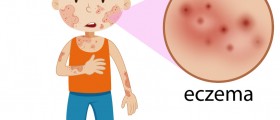




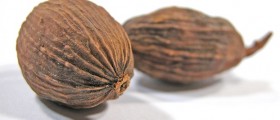
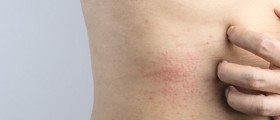
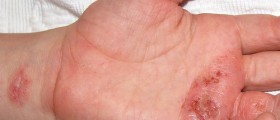

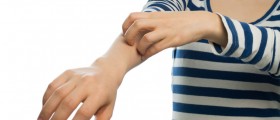
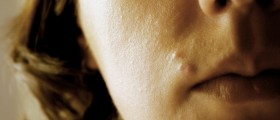
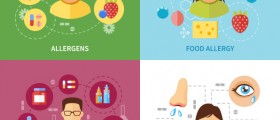

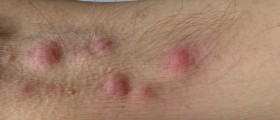
Your thoughts on this
Loading...